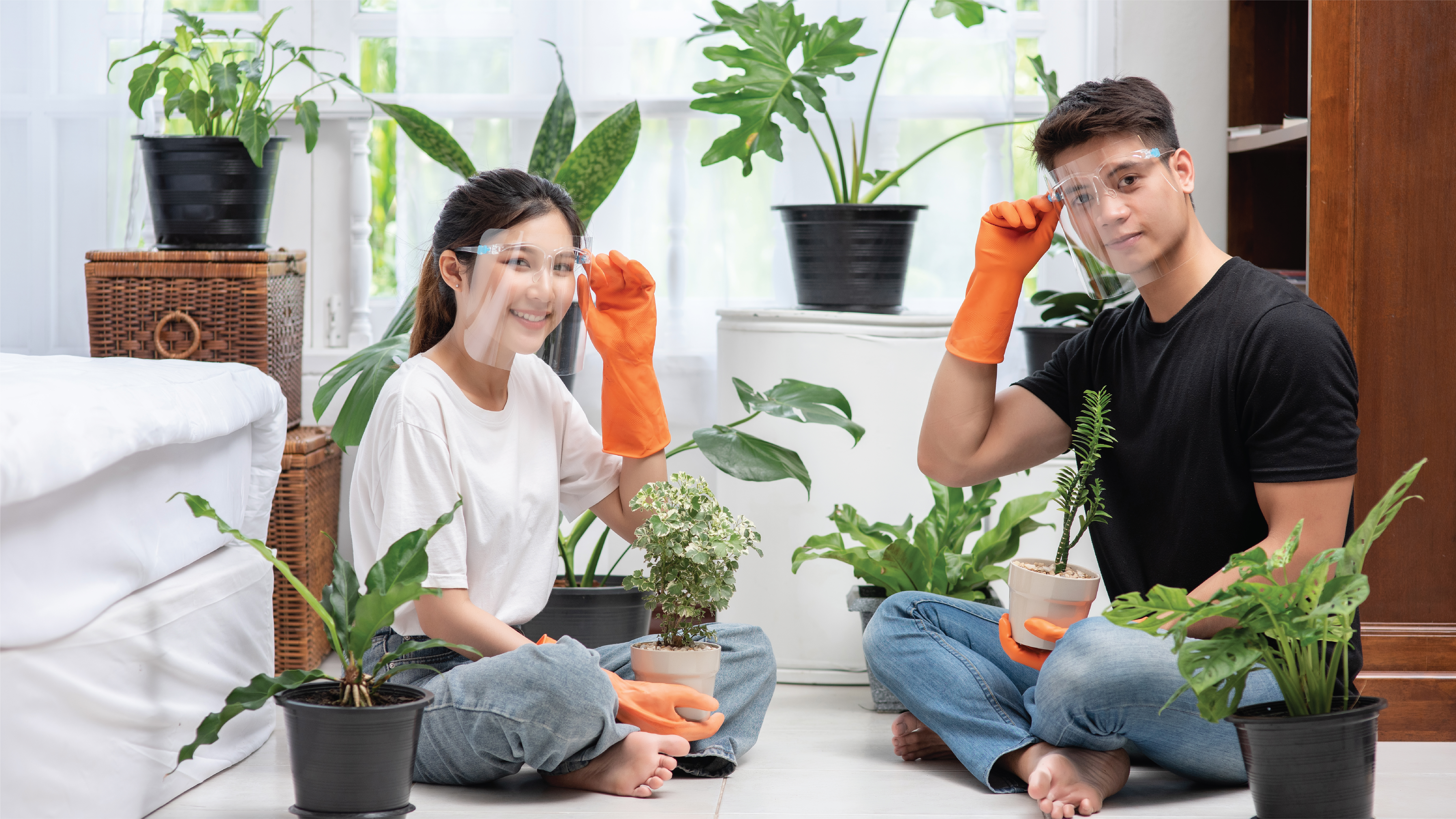In 2025, sustainability isn’t just a trend—it’s essential. As environmental awareness grows, so does the variety of eco-friendly options available for transforming your home into a green haven. By making small adjustments in our daily lives, we can significantly reduce our carbon footprint. For those new to sustainable living, Reyleaf has compiled a comprehensive guide on how to make your home eco-friendly. From energy-efficient upgrades to eco-conscious decor, here’s how to make a big difference.
1. Switch to Energy-Efficient Appliances
Investing in energy-efficient appliances is one of the most effective ways to reduce your home’s energy consumption. Appliances like refrigerators, washing machines, and dishwashers account for a significant portion of household energy use, so switching to Energy Star-certified options can have a considerable impact.
- Look for Labels: Choose appliances with the Energy Star label, which guarantees energy efficiency. In 2025, companies like LG and Samsung have developed models that use 20-40% less energy than conventional appliances.
- Smart Thermostats: Installing a smart thermostat such as the Nest Learning Thermostat helps regulate your home’s temperature efficiently. These devices learn your habits, automatically adjusting the temperature to save energy when you’re not home.
2. Install Solar Panels or Community Solar Subscriptions
Solar energy is a major step toward reducing your carbon footprint, but it’s not accessible to everyone. In 2025, community solar subscriptions allow renters or homeowners in areas unsuitable for solar panels to enjoy the benefits of solar energy without installation.
- Residential Solar Panels: Companies like SunPower and Tesla continue to lead in residential solar technology, offering panels that are more efficient and affordable than ever.
- Community Solar Options: Programs like Arcadia Power provide a solar subscription model where households can offset their electricity usage with solar credits.
3. Adopt Water-Saving Fixtures
Water conservation remains crucial for sustainable living. Low-flow fixtures reduce water usage without sacrificing performance, making them an easy way to save water and reduce utility bills.
- Low-Flow Showerheads and Faucets: Eco-friendly options from Kohler and Moen reduce water flow without compromising pressure, saving gallons each day.
- Greywater Systems: Greywater systems can recycle water from sinks and showers to be reused for irrigation. Companies like Greywater Recycling Systems provide home solutions that are affordable and easy to install, contributing to a significant water savings.
4. Opt for Sustainable Flooring and Paints
The materials used in your home play a big role in your environmental impact. Traditional materials, like carpet and certain paints, can be resource-intensive and release toxins. Switching to sustainable alternatives can improve indoor air quality and reduce waste.
- Eco-Friendly Flooring: Look for options like bamboo, cork, or reclaimed wood. Brands like EcoTimber offer flooring made from sustainable materials that add a stylish, eco-conscious touch to any home.
- Low-VOC Paints: Many paints release volatile organic compounds (VOCs), which can harm air quality. Companies such as Benjamin Moore and ECOS Paints produce low- or zero-VOC paints, which are safer for both your family and the environment.
5. Improve Home Insulation
Upgrading your home’s insulation reduces the need for heating and cooling, lowering your energy use. Good insulation maintains a stable indoor temperature, saving energy and keeping your home comfortable year-round.
- Insulate Properly: Consider eco-friendly insulation materials like recycled denim, wool, or cellulose. Companies like GreenFiber provide high-quality recycled insulation solutions that are as effective as traditional materials but kinder to the planet.
- Double-Glazed Windows: Double-glazed or energy-efficient windows keep heat inside during winter and out during summer, lowering the need for artificial heating and cooling.
6. Choose Eco-Friendly Furniture and Decor

Opt for furniture made from sustainable or recycled materials to add a touch of green to your home. Sustainable furniture brands are increasingly adopting ethical production practices, making it easier to decorate responsibly.
-
Sustainable Brands: Companies like West Elm and IKEA have launched eco-friendly furniture lines crafted from responsibly sourced wood, recycled fabrics, and organic materials.
- Upcycled or Recycled Decor: Look for local artisans or small businesses that focus on recycled or upcycled products. Reyleaf’s marketplace, for example, features eco-friendly home decor that combines sustainability with style.
7. Grow an Indoor Garden
Adding plants to your home has numerous benefits, from purifying the air to adding aesthetic appeal. Indoor gardens are easy to maintain, require minimal resources, and can even help reduce household waste.
- Herb Gardens: A small indoor herb garden can provide fresh ingredients while reducing your grocery bill. Companies like Click and Grow offer smart indoor gardening kits, making it easy to grow herbs, vegetables, or flowers indoors.
- Air-Purifying Plants: Plants like snake plants, spider plants, and peace lilies improve air quality by absorbing pollutants. Adding these to your home is a natural way to boost the indoor environment.
8. Implement Smart Technology
Smart technology can optimize energy use, reduce waste, and improve efficiency, making it a valuable addition to any eco-friendly home. In 2025, smart homes are more accessible than ever, with a range of affordable and effective devices.
- Smart Plugs and Lights: Use smart plugs and LED lights to control energy usage. Brands like Philips Hue and Wemo offer energy-efficient solutions that you can control remotely via an app, allowing you to turn off lights or appliances when they’re not in use.
- Water Leak Detectors: Preventing water waste is essential, and devices like Flo by Moen alert you to leaks before they become major issues. By catching leaks early, you can save both water and money on repairs.
9. Reduce, Reuse, and Recycle
Practicing the three Rs—reduce, reuse, and recycle—is a foundation of sustainable living. Reducing waste, reusing materials, and recycling as much as possible minimizes your home’s environmental impact.
- Composting: A composting system for kitchen scraps reduces landfill waste and provides nutrient-rich soil for plants. Brands like Lomi offer compact composters suitable for any home, making it easy to recycle organic waste.
- Recyclable or Compostable Products: Purchase products made from recyclable or compostable materials. Reyleaf’s marketplace offers a selection of sustainable home goods that are either compostable or made from recycled materials, helping to support a circular economy.
10. Embrace Eco-Friendly Cleaning Products
Many conventional cleaning products contain harsh chemicals that can harm both the environment and your health. Switching to eco-friendly cleaning products is a simple way to make your home greener.
- Natural Cleaners: Brands like Seventh Generation and Mrs. Meyers offer plant-based cleaners free from toxic chemicals. These cleaners are just as effective as traditional ones but are safer for the environment.
- DIY Cleaners: If you prefer a more hands-on approach, making your own cleaners using ingredients like vinegar, baking soda, and lemon juice is a cost-effective and eco-friendly option.
Conclusion
Creating an eco-friendly home in 2025 is easier than ever, with sustainable products and services becoming more accessible every day. By implementing some or all of these tips, you’ll not only reduce your environmental impact but also create a healthier, more efficient living space. From switching to energy-efficient appliances to adopting sustainable decor, every choice counts toward a greener future.
As you embark on your eco-friendly journey, Reyleaf is here to support you with a range of sustainable products and resources. Visit our marketplace for eco-friendly home goods, from decor to cleaning essentials, and join our community of environmentally conscious individuals who are committed to making a difference. Together, we can create a sustainable world—starting with our own homes.
Would you like more personalized recommendations for your eco-friendly home? Connect with Reyleaf’s community or browse our marketplace to find everything you need for a sustainable lifestyle!








